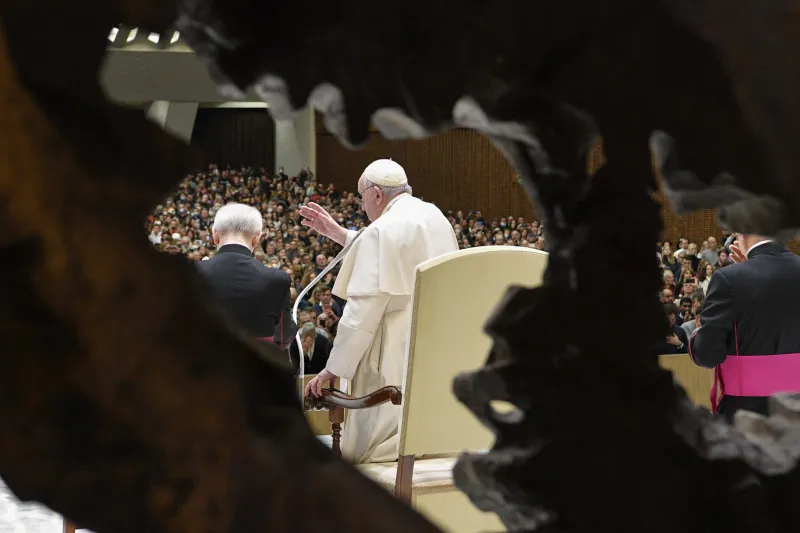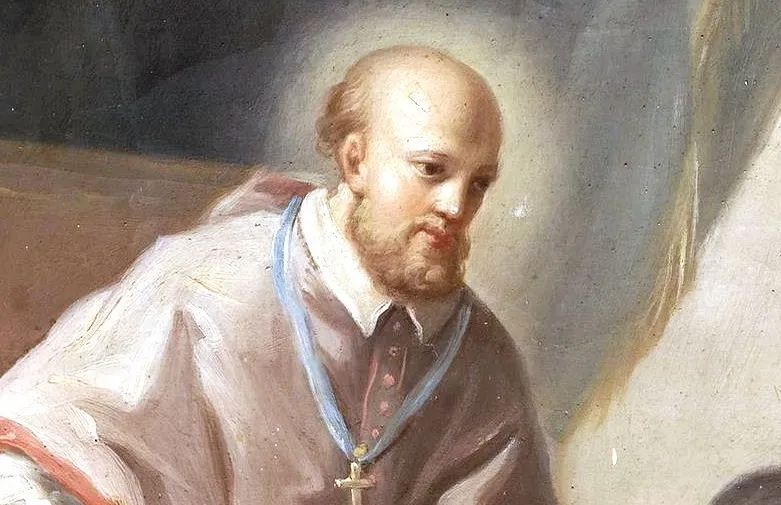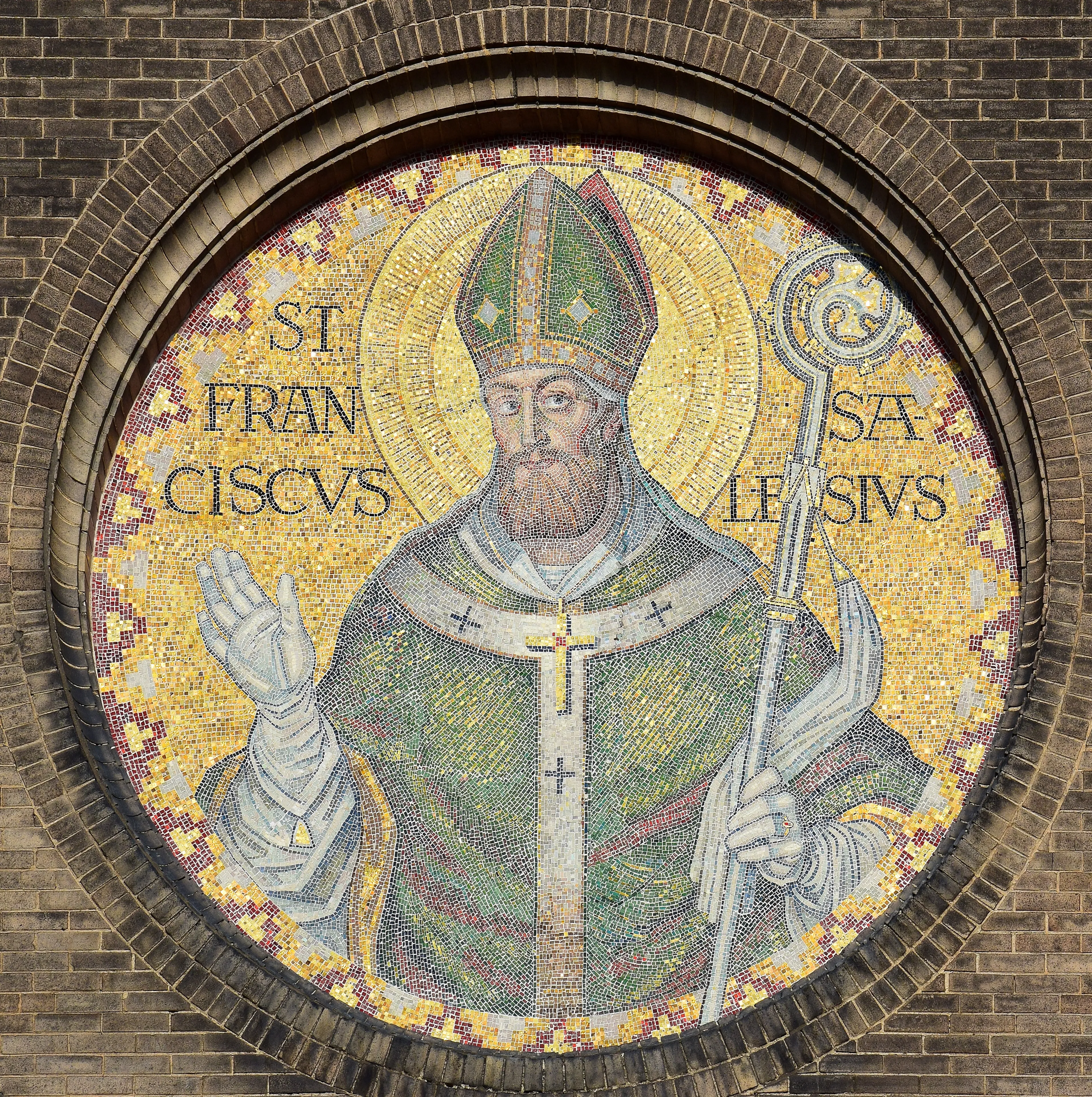Pope Francis on St. Francis de Sales: He taught that ‘devotion is meant for everyone’
Pope Francis waves during the weekly general audience in the Vatican's Paul VI Hall on Dec. 28, 2022. / Credit: Vatican Media. Vatican City, Dec 28, 2022 / 10:30 am (CNA). Pope Francis Wednesday published a message on St. Francis de Sales, a saint who teaches us that “devotion [to God] is meant for everyone, in every situation.”The pope’s apostolic letter, titled Totum amoris est, or “Everything Pertains to Love,” was published on Dec. 28, the 400th anniversary of St. Francis de Sales’ death in 1622.The title comes from the preface of the Swiss saint’s book “Treatise on the Love of God,” in which he wrote that “In Holy Church, everything pertains to love, lives in love, is done for love and comes from love.”St. Francis de Sales was a priest and bishop who taught against Protestant heresies and encouraged holiness in all people, no matter their vocation. He is known for his spiritual writings, including two books that are still widely read today: “An Introduction to the Devout Life” and “Treatise on the Love of God.” In 1877, he was proclaimed a Doctor of the Church.“On this anniversary of the fourth centenary of his death, I have given much thought to the legacy of Saint Francis de Sales for our time,” Pope Francis said in his apostolic letter. “I find that his flexibility and his far-sighted vision have much to say to us.”“Today he bids us set aside undue concern for ourselves, for our structures and for what society thinks about us, and consider instead the real spiritual needs and expectations of our people,” the pope noted.Saint Francis de Sales, painted by Francisco Bayeu y Subías. Wikimedia (CC0)Commenting on St. Francis de Sales’ teachings, Pope Francis said “devotion is meant for everyone, in every situation, and each of us can practice it in accordance with our own vocation.”“As Saint Paul VI wrote on the fourth centenary of the birth of Francis de Sales, ‘Holiness is not the prerogative of any one group, but an urgent summons addressed to every Christian: “Friend, come up higher” (Lk 14:10). All of us are called to ascend the mountain of God, albeit not each by the same path.’”“Devotion,” Paul VI said, quoting St. Francis, “must be practiced differently by the gentleman, the craftsman, the chamberlain, the prince, the widow, the young woman, the wife. Moreover, the practice of devotion must be adapted to the abilities, affairs and duties of each.”False DevotionIn his letter, Pope Francis reflected on what St. Francis de Sales called “false devotion” and its relevance for our spiritual lives today.Saint Francis de Sales. Kelson / Wikimedia (CC0)“Francis’ description of false devotion is delightful and ever timely. Everyone can relate to it, since he salts it with good humor,” the pope explained.De Sales wrote: “Someone attached to fasting will consider himself devout because he doesn’t eat, even though his heart is filled with bitterness; and while, out of love for sobriety, he will not let a drop of wine, or even water, touch his tongue, he will not scruple to drench it in the blood of his neighbor through gossip and slander. Another will consider himself devout because all day long he mumbles a string of prayers, yet remains heedless of the evil, arrogant and hurtful words that his tongue hurls at his servants and neighbors. Yet another will readily open his purse to give alms to the poor, but cannot wring an ounce of mercy from his heart in order to forgive his enemies. Another still will pardon his enemies, yet never even think of paying his debts; it will take a lawsuit to make him do so.”“All these,” Pope Francis said, “of course, are perennial vices and struggles, and they lead the saint to conclude that ‘all these fine people, commonly considered devout, most surely are not.’”True DevotionThe pope explained that St. Francis de Sales taught that true devotion, instead, is found in “God’s life dwelling within our hearts.”“True and lively devotion presupposes the love of God; indeed, it is none other than a genuine, and not generic, love of God,” the saint said.Saint Francis de Sales giving Saint Jeanne de Chantal the rule of the order of the Visitation /. nullPope Francis said: “In Francis’ lively language, devotion is ‘a sort of spiritual alertness and energy whereby charity acts within us or, we act by means of it, with promptness and affection.’ For this reason, devotion does not exist alongside charity, but is one of its manifestations, while at the same time leading back to it.”“Devotion is like a flame with regard to fire: it increases the intensity of charity without altering its quality,” the pope said, adding a quote from St. Francis de Sales, who said: “Charity is a spiritual fire that, when fanned into flame, is called devotion. Devotion thus adds nothing to the fire of charity but the flame that makes charity prompt, active and diligent, not only in the observance of God’s commandments but also in the exercise of his divine counsels and inspirations.”“Understood in this wa

 Pope Francis waves during the weekly general audience in the Vatican's Paul VI Hall on Dec. 28, 2022. / Credit: Vatican Media.
Pope Francis waves during the weekly general audience in the Vatican's Paul VI Hall on Dec. 28, 2022. / Credit: Vatican Media.
Vatican City, Dec 28, 2022 / 10:30 am (CNA).
Pope Francis Wednesday published a message on St. Francis de Sales, a saint who teaches us that “devotion [to God] is meant for everyone, in every situation.”
The pope’s apostolic letter, titled Totum amoris est, or “Everything Pertains to Love,” was published on Dec. 28, the 400th anniversary of St. Francis de Sales’ death in 1622.
The title comes from the preface of the Swiss saint’s book “Treatise on the Love of God,” in which he wrote that “In Holy Church, everything pertains to love, lives in love, is done for love and comes from love.”
St. Francis de Sales was a priest and bishop who taught against Protestant heresies and encouraged holiness in all people, no matter their vocation. He is known for his spiritual writings, including two books that are still widely read today: “An Introduction to the Devout Life” and “Treatise on the Love of God.” In 1877, he was proclaimed a Doctor of the Church.
“On this anniversary of the fourth centenary of his death, I have given much thought to the legacy of Saint Francis de Sales for our time,” Pope Francis said in his apostolic letter. “I find that his flexibility and his far-sighted vision have much to say to us.”
“Today he bids us set aside undue concern for ourselves, for our structures and for what society thinks about us, and consider instead the real spiritual needs and expectations of our people,” the pope noted.

Commenting on St. Francis de Sales’ teachings, Pope Francis said “devotion is meant for everyone, in every situation, and each of us can practice it in accordance with our own vocation.”
“As Saint Paul VI wrote on the fourth centenary of the birth of Francis de Sales, ‘Holiness is not the prerogative of any one group, but an urgent summons addressed to every Christian: “Friend, come up higher” (Lk 14:10). All of us are called to ascend the mountain of God, albeit not each by the same path.’”
“Devotion,” Paul VI said, quoting St. Francis, “must be practiced differently by the gentleman, the craftsman, the chamberlain, the prince, the widow, the young woman, the wife. Moreover, the practice of devotion must be adapted to the abilities, affairs and duties of each.”
False Devotion
In his letter, Pope Francis reflected on what St. Francis de Sales called “false devotion” and its relevance for our spiritual lives today.

“Francis’ description of false devotion is delightful and ever timely. Everyone can relate to it, since he salts it with good humor,” the pope explained.
De Sales wrote: “Someone attached to fasting will consider himself devout because he doesn’t eat, even though his heart is filled with bitterness; and while, out of love for sobriety, he will not let a drop of wine, or even water, touch his tongue, he will not scruple to drench it in the blood of his neighbor through gossip and slander. Another will consider himself devout because all day long he mumbles a string of prayers, yet remains heedless of the evil, arrogant and hurtful words that his tongue hurls at his servants and neighbors. Yet another will readily open his purse to give alms to the poor, but cannot wring an ounce of mercy from his heart in order to forgive his enemies. Another still will pardon his enemies, yet never even think of paying his debts; it will take a lawsuit to make him do so.”
“All these,” Pope Francis said, “of course, are perennial vices and struggles, and they lead the saint to conclude that ‘all these fine people, commonly considered devout, most surely are not.’”
True Devotion
The pope explained that St. Francis de Sales taught that true devotion, instead, is found in “God’s life dwelling within our hearts.”
“True and lively devotion presupposes the love of God; indeed, it is none other than a genuine, and not generic, love of God,” the saint said.

Pope Francis said: “In Francis’ lively language, devotion is ‘a sort of spiritual alertness and energy whereby charity acts within us or, we act by means of it, with promptness and affection.’ For this reason, devotion does not exist alongside charity, but is one of its manifestations, while at the same time leading back to it.”
“Devotion is like a flame with regard to fire: it increases the intensity of charity without altering its quality,” the pope said, adding a quote from St. Francis de Sales, who said: “Charity is a spiritual fire that, when fanned into flame, is called devotion. Devotion thus adds nothing to the fire of charity but the flame that makes charity prompt, active and diligent, not only in the observance of God’s commandments but also in the exercise of his divine counsels and inspirations.”
“Understood in this way, devotion is far from something abstract,” the pope said. “Rather, it becomes a style of life, a way of living immersed in our concrete daily existence. It embraces and discovers meaning in the little things: food and dress, work and relaxation, love and parenthood, conscientiousness in the fulfillment of our duties. In a word, it sheds light on the vocation of each individual.”
Love
Pope Francis also reflected on St. Francis de Sales’ teachings on love as “the first act and principle of our devout or spiritual life.”

“The source of this love that attracts the heart is the life of Jesus Christ,” he explained. “‘Nothing sways the human heart as much as love,’ and this is most evident in the fact that ‘Jesus Christ died for us; he gave us life through his death. We live only because he died, and died for us, as ours and in us.’”
“These words are profoundly moving; they reveal not only a clear and insightful understanding of the relationship between God and humanity, but also the deep bond of affection between Francis de Sales and the Lord Jesus,” the pope said. “The ecstasy of life and action is no abstract reality, but shines forth in the charity of Christ that culminates on the cross. That love, far from mortifying our existence, makes it radiate with extraordinary brightness.”














